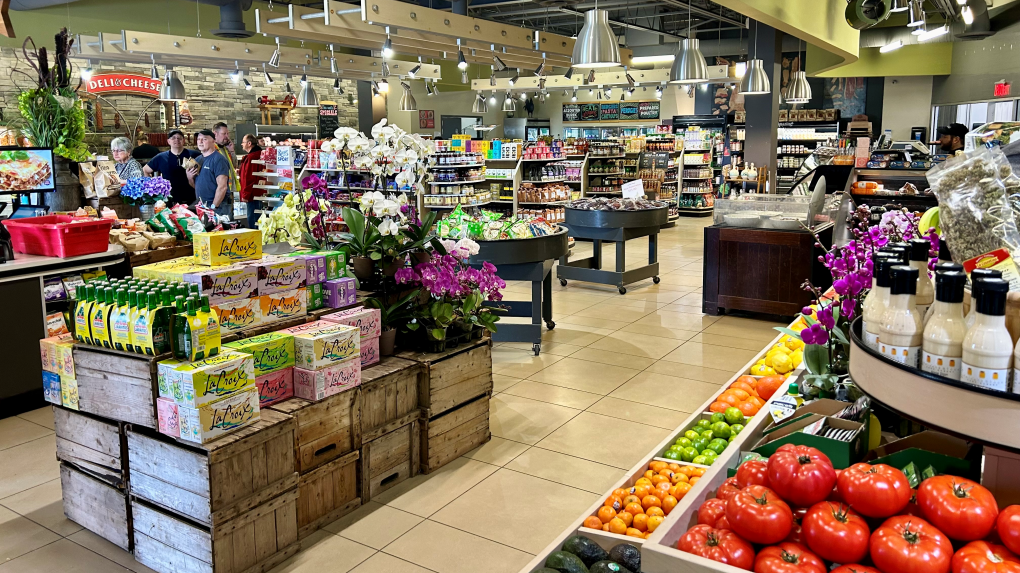Boycott aims to put pressure on Loblaw’s pricing policies
A proposed boycott of Loblaw stores is gaining momentum online.
Shoppers say they’re fed up with high food prices at major grocers and are urging others not to buy from any Loblaw-affiliated company during the month of May.
Talk of the proposed boycott started on social media, with organizers hoping to put pressure on the company to lower grocery costs and remove member-only pricing policies.
“I think something needs to be done for sure, because people can’t afford it,” one shopper told CTV News at a Kitchener Zehrs on Monday.
Others weren’t as optimistic.
“I don’t think it will make a difference to be honest with you.”
Organizers of the proposed boycott have a list of demands that includes a stop to retail-led price increases and an overall 15 per cent price reduction.
Loblaw responds
A spokesperson for the company told CTV News in a statement that the company is aware that they “have to win their customers’ business everyday.”
“The last few years have been tough for Canadians and we continue to do what we can to combat inflation at our stores,” the Loblaw PR statement said, in part.
For some Canadians, the proposed boycott doesn’t go far enough – a poster circulating online has declared May 12 “Steal from Loblaws Day.”
Loblaw called that “dangerous and irresponsible,” adding in a statement: “We sincerely thank the concerned groups, authorities, and many people who’ve denounced this behaviour. We certainly understand food affordability is an important issue affecting all of us, and we’ll continue to do everything we can, from lowering prices and making meaningful changes to our business, to help customers save money in our stores.”
Will a boycott help?
A food economics professor at the University of Guelph said he’s unsure a boycott of all Loblaw stores would make a difference to food costs.
“I know some of the demands have been reducing prices by 15 per cent. Well, grocers are making margins in the five and a half to six and a half per cent off net operating profit,” explained Professor Mike von Massow. “They just don’t have room to lower prices that much.”
He noted that rising prices aren’t primarily the grocer’s fault. He said other factors like the war in Ukraine, extreme weather impacts on production and the weaker Canadian dollar are mostly to blame.
“We've had this sort of perfect storm that's been, to a large degree, outside of the control of both grocers and the government,” said Massow.
He does, however, understand why shoppers are upset.
“We're looking for someone to blame and we feel the pain at the grocery store because that's where those prices are going up.”
Massow also believes a month-long boycott isn’t very sustainable as shoppers usually opt for convenience.
Shopping local
Places like Victoria Street Market in Kitchener are hoping people choose local, smaller shops instead of major grocers. All their produce and fruit is locally sourced from Waterloo Region.
 Victoria Street Market in Kitchener, Ont. on April 29, 2024. (Heather Senoran/CTV Kitchener)
Victoria Street Market in Kitchener, Ont. on April 29, 2024. (Heather Senoran/CTV Kitchener)
“The fact that we are smaller gives us the opportunity to adapt really quickly and make sure that things are not missed and everything's fresh all the time,” explained owner Bo Gedja.
Some shoppers also feel the customer service and food options are better at smaller stores.
“It seems more fresh compared to other local places. Everything seems more organized, filtered out,” said shopper David Lopez on Monday.
CTVNews.ca Top Stories

DEVELOPING Slovakia's populist prime minister shot in assassination attempt, shocking Europe before elections
The Slovak defence minister says doctors are fighting for the life of the country's prime minister, who was shot multiple times after a political event Wednesday afternoon.
Transport Canada's UFO 'lead' planned to meet with U.S. intel officials, called info requests a 'wild goose chase'
Canada's transportation department had a UFO 'lead' who tried to 'quell' media interest and planned to meet with U.S. intelligence officials.
'Very expensive lunch': Sask. driver handed a cell phone ticket for using points app in McDonald's drive-thru
A warning from a Saskatoon driver about using your fast-food app while in the drive-thru line — a trip to get some free lunch cost him a lot more than he bargained for.
'The Fly' has become notorious in France after a brazen escape. What's his criminal history?
A prisoner nicknamed “The Fly” has become notorious in France overnight after a daring and bloody escape from a prison convoy in Normandy that left two guards dead.
BREAKING Ontario's 'Crypto King' Aiden Pleterski arrested
Aiden Pleterski, the self-proclaimed 'crypto king' from Whitby, Ont., has been arrested in Durham Region after allegedly running a Ponzi scheme worth more than $40 million.
BREAKING Barge hits a bridge in Texas, damaging the structure and causing an oil spill
A barge slammed into a bridge pillar in Galveston, Texas, on Wednesday, spilling oil into surrounding waters and closing the only road to a smaller and separate island that is home to a university, officials said. There were no immediate reports of injuries.
Person responsible for 1996 drugging of 'Titanic' crew likely not a local: Halifax police
Halifax Regional Police believe a non-resident could be responsible for the infamous drugging of numerous crew members of the 'Titanic' movie with a hallucinogenic in 1996.
Latest updates on the biggest wildfires burning in Canada
Thousands of people in Western Canada remain displaced from their homes as wildfires threaten their communities, triggering evacuation orders and alerts.
OPINION If you think you can’t focus for long, you’re right: Sandee LaMotte
Regaining your focus requires you to be mindful of how you are using technology -- a daunting task if you consider the average American spends at least 10 hours a day on screens.





























